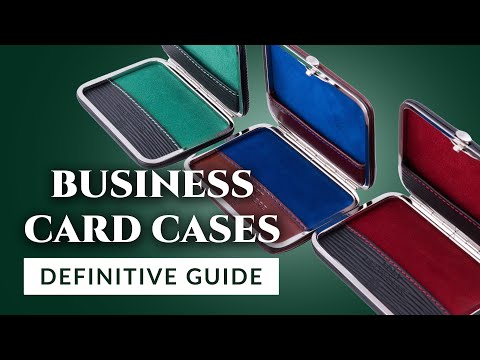Business Card Cases: Definitive Guide for Professional Style

Welcome back to the Gentleman's Gazette. Today's video will serve as the definitive guide to business card cases, so you can find the proper case to complement both your needs and your style. ♪ Gentleman's Gazette Theme Song ♪ In many ways, today's video is just as much about business cards as it is about business card cases. After all, to those you meet, your card is your company's introduction to the world and it reveals more than just contact info. In essence, the condition of your card also says something about you. To put it even more simply, compare this to this. As you can see, well cared for
business cards in a quality case will make a much better first impression. We'll go so far as to say that if you have business cards, then you should be carrying a business card case. But, which case is best for you? We're going to find out in today's definitive guide to business card cases. But, first -- [scene from American Psycho] Bateman: "Let's see Paul Allen's card." No, Patrick. But, first, let's look at the history of the business card case. One more brief note here: today's video is another installment in our "Definitive Guide" series,
and you can find the full playlist for the series here. Business cards evolved from calling cards, which were commonly used in the 18th, 19th, and early-20th centuries. Among some members of society, especially the wealthy and aristocrats, guests would be greeted at the door by servants, not by the owners of the property. Visitors, therefore, needed to identify themselves through this intermediary, so they would present a calling card. This card would commonly feature the visitor's name and title and, sometimes, their profession or address. It would be brought to the owners of the property, who would then decide whether or not they wanted to see the visitor in question. Calling cards eventually developed into business cards, which, of course,
would advertise one's profession rather than one's person. They could then be handed out whenever one felt it was necessary or appropriate to share important business information. Because, in both of these cases, impressions were so critical then, both visitors with calling cards and businessmen with business cards figured out just how useful a good card case could be. They protected one's cards from damage and also allowed the user to show off their own taste and style with the case's design.
For the wealthy, luxurious and highly-decorated cases became popular like this example from 1851 depicting the Crystal Palace at the famous Hyde Park Great Exhibition, this case from 1860 showing the Dublin General Post Office, or this incredible Victorian case made from papier mâché and inlaid mother-of-pearl with a painted floral scene. Indeed, we salute the Victorians for taking their card cases so seriously. As the 20th century progressed, calling cards fell out of favor, but business cards remained essential as a way to share business and contact information. Therefore, business card cases remained popular among discerning businessmen. After all, if you're going to all the trouble of engraving cards that have subtle off-white coloring, tasteful thickness, and even a watermark, you'll want to keep them well preserved. It should be no surprise, by the way, that we've made ample reference to that scene, and don't worry, it will be back later. As with many aspects
of style in the late-20th century, however, pursuit of the cheap and easy led to an overall decline in the production of quality card cases. Where, once, cases had predominantly been made from leather or precious metals, now, cases were more commonly and cheaply made from plastics. More men also started abandoning card cases in the late-20th century, instead trying to fit their cards into already over-stuffed wallets or carrying them loosely in their pockets. And, even today, despite the
prominence of digital business, business cards and card cases remain the most professional and stylish way to exchange information. After all, have you ever seen a gaggle of people standing around in an awkward circle, trying to exchange phone numbers at a conference or convention? It's, decidedly, not a good look. But, of course, there's nothing stylish about a business card that's crumpled or stained because of a lack of care and protection. So, let's turn our attention to business card case types with an emphasis on cases that guard your card while also looking great. And to make this examination as useful as possible, we'll start here with types of cases that you should avoid. First here would be slash cases, which don't fully protect your business cards. And, after
all, if your cards can still get damaged while they're in the case, what's the point? Next would be trendy or extremely modern designs, which not only don't fit into the classic style aesthetic, but also, because they are so modern, may feature designs that haven't been very rigorously tested and so, could potentially lead to more card damage over time. Mechanical or spring-loaded cases that extend or even launch your cards are not only gimmicky, but also come off as juvenile. And, finally here, novelty or custom cases may be acceptable if you're in a particularly creative field, but they can come off as cheesy in most other settings. If you've noticed a trend here among these types to avoid, it's just that: trendiness. As we've already mentioned, cards and card cases have been around for centuries. So, to stick to some tried and true examples of quality,
let's take a look at types you'll want to consider. First up here is the slip case, which is the slimmest option that's going to be available. The slip case offers an extremely minimal profile, but at the cost of storage space and some convenience. If you typically find yourself only carrying a dozen or so cards, this may be a good choice for you, depending on the thickness of said cards. Otherwise, you'll probably be refilling a case like this fairly constantly and you may run out on busy occasions. Depending on the design, they may also leave portions of the card exposed and, thus,
aren't really much of an improvement over the slash cases we mentioned before. They also tend to be constrictive, which can make accessing your cards difficult at times. For a bit more added room then, consider what's usually called "the simple case." Fittingly, these cases are simple and easy to use, but they offer little organization. At a busy conference or meeting then, there is the potential to mix up your cards with the cards you receive from others. The bifold case keeps cards separated in different compartments, which can solve this problem. But, storage space can vary. We'd note
here that exposing even a fraction of your cards can lead to staining over time as grime from your pockets gets into the bifold. Some bifold cases will offer a protective flap to mitigate this, but it usually isn't a complete seal. With bifolds then, as with some other designs we've already mentioned, the price you pay for the slim and elegant profile is reduced protection for your carts. Speaking of bifolds, wallets and billfolds are sometimes repurposed as dedicated business card cases. But, because they weren't designed for this purpose, they tend to be bulky or otherwise unwieldy. If, however, you are in the market for a quality wallet used for its intended purpose, you can find our guide to wallets here. But, when it comes to business cards, you do want something that's
purpose-built. That's why we strongly recommend what's commonly known as "the rigid case." The rigid case provides total protection for your cards, also with ample storage. The best examples will also have pockets to securely separate and hold your cards and those you might receive. And contrary to what you might assume, well-made cases won't add too much bulk. So, unless you need something very particular in your card case - like for it to be collapsible or extremely thin - we think that a rigid pocketed case is the best choice for most men. But, not all business card cases are created equal, so let's now turn to what makes a quality card case. For durability, functionality,
and styling, the materials that go into your card case are extremely important. As is usually the case, we suggest avoiding plastics or other synthetics as they tend to be flimsy and not durable, poorly constructed or finished, bad for the environment and to give a poor impression overall. For better choices and quality materials then, you can look to more traditional options; those being leather and metal. Metal was once a mainstay of men's business card cases, typically being made from silver or gold or plated base metals. Metal was a popular choice because of its durability, its appearance, which could be heavily ornamented or decorated, and because it was a status symbol. This is probably why everyone's favorite business card scene features nothing but metal cases.
[scene from American Psycho] See. We told you it would be back. Note, though, that all metal cases can be on the heavy side, and they can also leave an unsightly bulge that will ruin the clean lines of your outfit. Many also have sharp corners, which could damage the fabrics in your outfit, and even rounded corners can sometimes be enough to leave an indentation over time. They may or may not have pockets and, if they do, those pockets must be tight in order to keep the cards securely in place and avoid having them rattling around inside the case. Unless, of course, you find yourself in the mood for a maraca solo, that is. New high-quality metal cases also tend to be expensive because of the rising cost of precious metals. Second-hand and vintage cases can be a great option then and, indeed, many men
repurpose old cigarette cases as business card cases today. But, of course, cigarette cases were designed to hold cigarettes, not business cards, so they won't have all the functionality you're going to need. It's not surprising then that all metal cases have largely fallen out of favor as leather is conversely viewed to be more convenient, more comfortable, and more economical. In our opinion, animal leather is the best material for most business card cases. But, with that said, we know that some people are averse to using animal leather products. On that note, you can find
more information in our vegan leather guide here and, if you've watched our channel before, then it's likely you already know that not all animal leather is created equal either. What leather qualities do you want in a card case then? Well, the best examples are going to vary based on individual functionality. For the outer shell, you're going to want a sturdy, hard-wearing leather that still appears elegant and refined. Leather from cervids, like deer or
elk, is hardy, but it can have a rough and almost rustic appearance. Often times then, it will appear a bit too casual for a business card case. Exotic leathers like crocodile, alligator, lizard, or ostrich are durable and distinctive, but they can also be distracting. Not to mention, these types of leathers can also frequently be pretty expensive. In most cases then, bovine leather
is a good middle ground between durability and dignity, but don't just settle for plain old genuine leather. Calf leather offers a soft, supple texture combined with excellent longevity and a refined appearance. And, for a unique grain, you could also consider bison leather. Here at Fort Belvedere, we source only the finest quality bovine leathers directly from Germany and other reputable tanneries. Meanwhile, for the interior of the case, the main concern is going to be softly cushioning and protecting the cards. Because a soft, yet protective lining is paramount then, suede is a great option here. Some manufacturers are going to skimp on the insides of their card cases, using cowhide or imitation leather that has been treated to look like suede. Meanwhile,
at Fort Belvedere, we've specifically selected goat velour for the interiors of our cases as its weight and density create the perfect padding. It also provides unique visual interest and, of course, is soft to the touch. Also, this padding isn't just good for your cards, as you should be able to notice the difference of how softly and lightly the card case will sit in your pocket. And for added security, pocket straps made from leather will help to keep your cards securely and safely in place while breaking up the uniform look of the lining. At Fort Belvedere, we use the same top-quality aniline leathers for the pockets as we do for the exterior shell. By the way, for more
information on leather production and the effects of different treatment processes on leather, you can find our video on the difference between chrome-tanned and vegetable-tanned leathers here. Next, we'll touch on construction as, in addition to the leather itself, how it's framed and affixed is equally important. A genuine metal frame, of course, is going to last longer overall, and it will handle incidents like dropping better than most plastic frames. The best frame assemblies are going to
be handmade and, indeed, that's the case with our offerings at Fort Belvedere. They're put together by skilled German craftsmen to ensure tight fits, sturdy materials, and impeccable oversight. And, when properly assembled, components like the lining and interior fastenings aren't going to come loose or undone and won't look prematurely worn or frayed over time. You needn't resign yourself to a bulky case to achieve security for your cards as quality construction will also still mean a slimmer profile. Well-made cases, then, are designed for maximal volume with minimal mass.
This was a major factor for Raphael when he designed our Fort Belvedere card cases, which are engineered to slip effortlessly into a jacket or trouser pocket and not leave any unsightly lines or bulges. After all, you don't want someone asking, "Are you going to offer me your business card or are you just happy to see me?" Finally here, your cards aren't going to do you much good if they're stuck in your case or otherwise difficult to access. Quality workmanship will usually ensure a quality clasp. But, for the best possible results, go for a clasp design that requires only one hand to open. Again, our Fort Belvedere cases will allow you to seamlessly open your case with one hand and collect your card with the other. You're going to be best served by a case with a more
formal exterior in terms of styling - one that will fit a variety of dress codes and occasions - because, after all, you never know quite when you're going to want to exchange business cards. Therefore, we'd recommend that you go with classic leather colors like oxblood, dark brown, whiskey brown, and black. All of these are timeless choices and you can add unique personality with details like a contrasting interior lining or stitching in colors like green, blue, or red as examples. This way, you'll draw attention to your card as you're drawing it out and also set yourself apart as a stylish sartorialist. On that note, if you'd like some ideas on how to pick the perfect colors for your wardrobe and ensembles, you can find our video on using the color wheel here. When it comes to cost,
as with most things, you're generally going to get what you pay for. New, all-metal cases can easily cost hundreds of dollars, depending on whether gold or silver are used and how much of them are used. Again, though, vintage or used models can often be found for under a hundred dollars. Meanwhile,
for quality leather, you can typically expect to spend between $125 and $200 for a new case, depending on its size and the quality of the leather in question. So, we hope that our guide will help you to find a business card case that suits both your needs and your style. After all, business cards act as a public face of your company and you'll want to keep them looking good. Therefore,
based upon all the criteria we've mentioned here today, we believe that our Fort Belvedere offerings are the best case scenario. In today's video, I'm wearing a formal, business-appropriate outfit that's based around the colors of my own personal Fort Belvedere business card case. The case in my personal collection is our model in dark brown bison leather with a sand interior.
As such, I'm wearing a two-piece suit in dark brown that features a subtle pinstripe of alternating tan and light blue. My shirt, which I personally designed through proper cloth, is in a color they call "terracotta," a sort of tannish brown shade and in a glencheck pattern. My shoes - also designed by me using the Undandy website - are dark brown suede cap-toed Oxfords. The remainder of my accessories
today come from Fort Belvedere, and we'll start with my shoelaces, which are in a caramel color, and my socks, which are two-toned shadow-stripe models, also in caramel and dark burgundy. My cufflinks are our gold-plated, sterling silver eagle claw designs featuring tiger's eye as the stone to reinforce the color feel, and my wool challis tie features a repeating pattern in blue, green, and red. Its base is sunflower yellow. My pocket square is in a silk-wool blend in a color we're calling "antique gold ochre," and it features medallions in beige, red, and blue with a cream contrast edge.
Finally, the boutonniere I'm wearing is a yellow buttercup to also reinforce the overall color feel of the outfit. For all of the Fort Belvedere accessories I'm wearing in today's video and, of course, for our range of business card cases, you can take a look at the Fort Belvedere shop here. ♪ Gentleman's Gazette Theme Song ♪
2022-02-08 19:28


